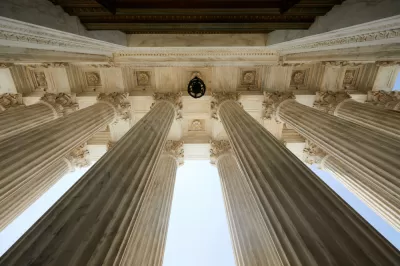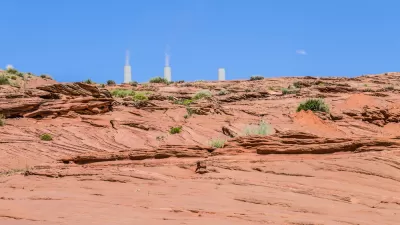By overturning the Chevron doctrine, the Supreme Court stripped federal agencies like the EPA of final say when interpreting ambiguous legislative policies, leaving future decisions up to judges.

According to an article from Grist, “The Supreme Court on Friday threw into question the future of climate and environmental regulation in the United States, scrapping a decades-old legal precedent that gave federal agencies leeway to interpret laws according to their expertise and scientific evidence.” Legal experts say the decision, which overturns the “Chevron deference” could lead to an increase in legal challenges against federal agency regulations that keep our land, water, and air clean, and mitigate climate change.
Grist reporters Jake Bittle and Zoya Teirstein write, “Federal courts have long deferred to federal agencies to interpret laws that are unclear and need further clarification. In 1984, a shorthanded Supreme Court ruled in a unanimous decision that federal agencies have the final say on ambiguous policies, which allowed those agencies broad authority to make decisions without fear of judicial override.” The Supreme Court’s recent decision revokes that authority and instead will leave decisions up to judges, who do not have the breadth of financial, scientific, and safety expertise that federal agencies have.
The Grist article delves deeper into the Court’s opinions, but broadly, the Court’s majority opinion (6-3) felt the Chevron deference stripped courts of judicial power and permitted overreach by the executive branch, while dissenting justices say that authority was crucial to protect the environment, public health, and economy and that, without it, the Supreme Court will now function as the “country’s administrative czar.”
“What’s at stake [in the decision] is whether courts are going to defer to agencies interpreting statutes or whether courts are going to stop doing that, and with more regularity take it on themselves to interpret the statutes even when they’re ambiguous, which means they may be in the position of making more policy choices,” Michael Burger, the director of the Sabin Center for Climate Change Law at Columbia University, told Grist.
FULL STORY: The Supreme Court overturns Chevron doctrine, gutting federal environmental protections

Planetizen Federal Action Tracker
A weekly monitor of how Trump’s orders and actions are impacting planners and planning in America.

San Francisco's School District Spent $105M To Build Affordable Housing for Teachers — And That's Just the Beginning
SFUSD joins a growing list of school districts using their land holdings to address housing affordability challenges faced by their own employees.

The Tiny, Adorable $7,000 Car Turning Japan Onto EVs
The single seat Mibot charges from a regular plug as quickly as an iPad, and is about half the price of an average EV.

With Protected Lanes, 460% More People Commute by Bike
For those needing more ammo, more data proving what we already knew is here.

In More Metros Than You’d Think, Suburbs are Now More Expensive Than the City
If you're moving to the burbs to save on square footage, data shows you should think again.

The States Losing Rural Delivery Rooms at an Alarming Pace
In some states, as few as 9% of rural hospitals still deliver babies. As a result, rising pre-term births, no adequate pre-term care and "harrowing" close calls are a growing reality.
Urban Design for Planners 1: Software Tools
This six-course series explores essential urban design concepts using open source software and equips planners with the tools they need to participate fully in the urban design process.
Planning for Universal Design
Learn the tools for implementing Universal Design in planning regulations.
Smith Gee Studio
City of Charlotte
City of Camden Redevelopment Agency
City of Astoria
Transportation Research & Education Center (TREC) at Portland State University
US High Speed Rail Association
City of Camden Redevelopment Agency
Municipality of Princeton (NJ)





























